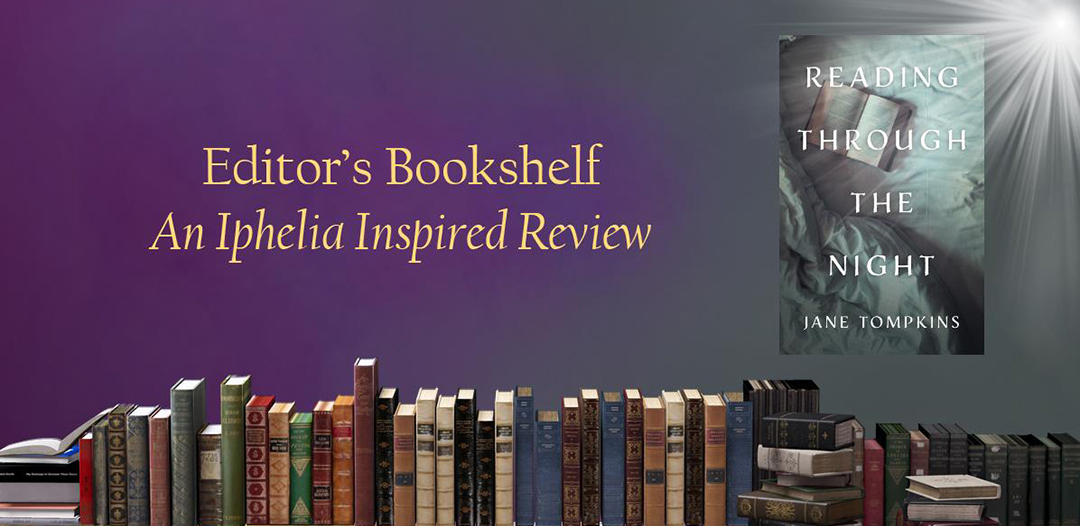
Some of us are very attached to our best-laid plans and expectations. Not getting what we want, what we believe we worked for and earned, can be a tremendous blow to the ego. It can leave us feeling, on the one end of the spectrum, miffed and irritated—scrambling for the next plan, the next best thing—or, on the other, outraged, shameful, blameful, insecure, anxious, and depressed.
Using Editor’s Bookshelf to review and promote soon-to-be-published books that help people connect with their feelings was one of my best-laid plans. Last month, we had the pleasure of publishing “Those Sounds Again,” a piece of short fiction, in place of Editor’s Bookshelf, which felt like a relief and a welcome change of pace. This month, however, when I realized Reading Through the Night, the book I’d selected for my May review, had already been published, I found myself in the throes of some growing pains.
How could I miss this? Who was to blame? I had nearly finished the book and was completely smitten with what Jane Tompkins does in its pages. I didn’t want to dedicate time to reading and reviewing something else. But publishing an Editor’s Bookshelf review of Reading Through the Night now, six months after it was actually published, would mean amending Editor’s Bookshelf’s purpose. Again, I like my best-laid plans. And I don’t tend to like change, especially when it’s happening.
After corresponding with Darcie Rowan Public Relations, I learned that the “publication date” I’d based my decision to review on was actually a reflection of the time the publisher and author had given Darcie to secure more interest in the book. “Unfortunately, when the book was published the author was ill and much of the promotional opportunities originally planned went astray,” Darcie told me. “I love the book so much that I asked the publisher to let me see if we can eek out more reviews.” Darcie was doing her best to revive some interest.
I left this exchange with a lot of food for thought. My pride and ego wanted Editor’s Bookshelf to remain what it was, retaining the novelty of featuring only soon-to-be-published books. But something in my heart resonated with Darcie’s words. I quietly determined to finish the book and review it here despite its September 2018 publication date.
Why? Because Reading Through the Night is so much more than the biography or memoir of a highly-educated woman reading her way through a debilitating illness. It is medicine for intellectual bypass, or what Erick refers to as intellectualization in Iphelia: Awakening the Gift of Feeling.
Of course this is something I’ve dealt with most of my life, and it’s not just evidenced by multiple degrees, a comfort zone that’s predicated on ideas, or a tendency to fall into “teacher’s pet” roles.
Tompkins invites readers to accompany her on perhaps the most intimate journey: the one where she sees herself not just in spite of, but because of reading, an activity she’s relied on for many different reasons.
Reading Through the Night will not appeal to a general audience, but it will delight and create space for those who’ve dedicated their lives to educating themselves, only to be left looking for something beyond what the ivory tower can provide. If you relished comparative lit classes, but understand the characters’ feelings better than your own, this book is for you.
Other reviewers have noted that Tompkins spends a great deal of time quoting and analyzing a few specific authors. This might not facilitate everyone’s feeling experience, but if you have been extremely impacted by any one author’s work, Tompkins’ almost obsessive analysis will make immediate sense to you. (I had similar experiences as Tompkins’ reading the biography Pearl Buck in China: Journey to The Good Earth by Hilary Spurling. I identified closely with Buck until I read Journey to The Good Earth and wished I’d never identified with her at all. Spurling’s deep dive into Buck’s life made it impossible to deny that our tragedies and shadows were just as aligned as some of our passions and convictions. My own journey into therapy began shortly after that).
As Tompkins notes just at the end of the book, “When a book upsets or troubles you, you need to find out why. …When a sentence or a scene or a character grabs your attention and won’t let go, you can be sure it’s the symptom of some inner business unresolved.”
Tompkins’ candor, her lucidity, and her plunging-into-uncomfortable-waters vulnerability amount to one of the best invitations I’ve encountered for bookish types (myself included) to make the leap from thinking to feeling, from understanding things about the world around them to truly listening to themselves. And that is, without a doubt, more important than a publication date.
Editor’s Bookshelf is a regular review of soon-to-be-released books that, in the spirit of Iphelia, asks important questions about how the written word—and in some cases, imagery—are used to help readers reconnect with their feelings, themselves, each other, and the world around them.
Iphelia’s editor, Linsey Stevens, answers these questions—chiming in on who will be most captivated by each book’s contents and how it invites readers to return to a heart-centered way of being.
Reading Through the Night by Jane Tompkins was published on September 18, 2018 by University of Virginia Press. For more on Iphelia: Awakening the Gift of Feeling, (and to order your copy of the stunning Children’s Edition…released March 30!) visit our books page.

